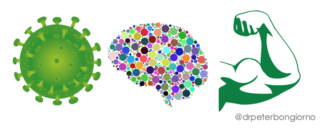
Stress
Immunity and the Mind: 7 Steps
What can both help your immune system and your mood?
Posted September 18, 2020

Your mind allows you to be aware of the world around you—it forms your perception of the world. Your mind and your thoughts help you decide whether the world is safe, or is a place of distress. As a result, perception helps you decide if you are someone who is generally calm and confident, or someone who might be anxious more often than not.
Your immune system is responsible for defending your body against viruses, like the new COVID-19 virus. The innate immune system is your first line of defense against these viruses. In the clinic, we are seeing that people who have stronger innate immune systems, like younger people[1], and those with sufficient levels of important immune-boosting vitamins, like vitamin D [2] tend to fend off this virus better.
While youth, good nutrition, and a healthy body can be protective, research is also showing us that the mind and how we perceive the world can also play an important role in how well we can fend off infection. Your ability to fight viruses and bacteria may also be decided by the level of stress you have, as well as whether you are generally a happy person or an anxious one. Some studies have shown that adults who go through long term stressors like caring for sick loved ones or have to persevere through nerve-wracking work conditions over a long time period have higher rates of respiratory tract infections from the common cold—which is a coronavirus.[3] It is likely chronic stress makes it harder for our body to fight this new coronavirus too.
Chronic Stress Lowers Immune Function
A large study called a meta-analysis (a study of many studies) from 2004 looked at over 300 different research articles conducted over 30 years on the subject of immunity. Each paper evaluated the amount of stress people had, and how well their immune system worked. The results were clear, as study after study showed the same thing: short term stress would temporarily increase the ability of the immune system to fight, but chronic long-term stress suppressed the immune system. Even more, it showed that those people with the most chronic stress had the most immunity loss.[4] The authors of this paper mentioned that losing a job, or becoming a caregiver for a sick family member were up there with the most immune-stopping life events.
How Does Stress Affect the Immune System?
There’s a middle part of the brain is called the hypothalamus. In this important brain area, the immune system, nervous system and hormonal system all talk to each other. As an example, if you see a bear, your body goes into a stress mode that is ready to fight or run away. When the body is stressed out it sends signals from this area through nerve fibers that go throughout the body to create the stress response. In the short term, like when you are actually running from a bear, this fear response can help you run faster by getting you energized. This fear mode can save your life. In the short term, the stress response pumps up your immune system. Your body has great wisdom—it knows you might get injured during the fight and be exposed to bacteria or viruses if you get cut. So, this stress response can improve your immunity to help you quickly kill the invaders before they take hold in the body.
But, let’s say there are many bears coming after you, and they decide to organize to each takes turns chasing you, so that every hour of everyday, you need to run from a bear with little or no break from the stress. In this case, when stress goes on for too long, your system gets depleted. Stress hormones like cortisol that are raised for too long will start to suppress your immune system. While this bear scenario might be far-fetched, for someone who has a lot of work stress, is taking care of sick family members, and is worried about money—it is as if they are running from many bears all the time. Their immune system will get depleted and stop the ability to fight. Then, when a nasty virus like the COVID-19 virus comes along, their body just can’t cope. While the fear response is helpful in the short term, it hurts our immune system in the long term.
Seven Steps to Calm Your Mind and Strengthen Your Immunity
So, what can you do to help calm your mind and strengthen your immunity? While there is no one magic bullet that will take care of it, I have found a regimen my patients can follow which clearly calms their mind and will boost the immune system at the same time:
1. Get Enough Sleep: Sleep is the important time your body and brain clean out and fix things. Not getting enough sleep alone creates a powerful stress response.[5] Good sleep enhances immune function.[6]
2. Exercise and Yoga: When you are running from the bear, you are making and braking down stress hormones. But if you are stressed and not moving your body, the stress hormones will ravage your body, making you feel stressed, and squashing immune function in the process. Yoga is especially beneficial. Practitioners of yoga enjoy its proven ability to both lower stress hormones[7] and prevent the negative immune changes that comes with stress.[8] Whatever exercise you choose, it can be gentle as as you need—any movement will have benefit.
3. Get Into Nature: one of the best ways to soothe your body and jump start your immunity is spending time in the natural world. We co-evolved with nature, and our genetics are made to respond positively to fresh air, trees and plants. Studies clearly show people who spend time in nature breathe in molecules called phytoncides which get into the blood stream to have positive effects throughout the body. People who spend time in nature see decreases in psychological stress[9] while enjoying simultaneous boosts in immune cells called natural killer cells.[10]
4. Work with a Therapist and Think Positively: one of the reasons the stress response can be chronic is because thoughts in our head can habitually keep going and going, without stopping. What we are telling ourselves (like “ I am not competent” or “life is a struggle”) can keep the bears coming. The thoughts we create in the thought center of our brain (called the prefrontal cortex) tells the stress center of our brain (called the amygdala) to create a stress response. And this has been shown in research—for example, a study of 124 first year law students clearly showed that just having optimism about their school had positive changes in the immune system's ability to work.[11] Talking to a therapist about your stress and using techniques like cognitive behavioral therapy (CBT) are proven to stop that cycle, and calm the stress response while foster positive thinking. This change in thought will help the immune system remain function at full competence.
5. Eat Healthy Food: a very recent trial showed conclusively what your grandmother already knows—when you eat healthy foods your brain works better and there is less chance of anxiety and depression. [12] Studies on eating a Mediterranean Diet (little meat, some fish, lots of vegetables and healthy olive oil) also show people will have less anxiety.[13] and will lower inflammation[14], allowing an optimal immune response when needed.
6. Meditate: whether it is meditation, or some kind of relaxation work, it is important to send a signal to your body every day that there isn’t a bear coming at you and that you are in a safe place. Studies in mindfulness meditation not only calms the body, but is being shown to lower inflammation, strengthen immune response, and even decrease cell and immune aging.[15]
7. Take the Right Supplements: When you take a supplement, you are taking in a natural substance like an oil or plant to help stimulate your body to heal. Here are three natural supports that can both increase immunity and help lower stress response at the same time:
- Ashwaganda: This is an herb from Ayurvedic medicine known for thousands of years for its ability to bring vitality to the body. It is also known for its ability to raise GABA (gamma amino butyric acid), a calming neurotransmitter in the brain[16], as well as stop immunosuppression.[17] Please visit my past post on this herb.
- Fish oil: Fish oils directly support nervous system and immune function by helping to build the cell membranes nerve and immune cells need to function their best. One study on medical students showed how fish oil can help lower anxiety and balance the immune system by lowering inflammation.[18]
- Melissa officinialis: This is an herb well-known by botanical medicine practitioners. It serves as both a soothing and immune-enhancing plant. Studies have shown how it possesses potent immune refreshing activities.[19] A trial on patients with chronic angina has even shown how it can help significantly promote sleep, lower anxiety and stress response, and even decrease depression in those patients.[20]
Conclusion
The mind is very powerful and can either enhance immune function or stop it from working properly. Fortunately, there are many natural ways to help send signals to shift both your mind and immune power to help you feel less stressed, and create a better immune system. For more, please see my video interview on the subject here.
References
[1] Dhochak N, Singhal T, Kabra SK, Lodha R. Pathophysiology of COVID-19: Why Children Fare Better than Adults? [published online ahead of print, 2020 May 14]. Indian J Pediatr. 2020;1-10. doi:10.1007/s12098-020-03322-y
https://www.ncbi.nlm.nih.gov/pmc/articles/PMC7221011/
[2] Marik PE, Kory P, Varon J. Does vitamin D status impact mortality from SARS-CoV-2 infection? [published online ahead of print, 2020 Apr 29]. Med Drug Discov. 2020;6:100041. doi:10.1016/j.medidd.2020.100041
https://www.ncbi.nlm.nih.gov/pmc/articles/PMC7189189/
[3] Cohen S, Tyrrell DA, Smith AP. Psychological stress in humans and susceptibility to the common cold. New England Journal of Medicine. 1991;325:606–612. https://www.nejm.org/doi/full/10.1056/nejm199108293250903
[4] Segerstrom SC, Miller GE. Psychological stress and the human immune system: a meta-analytic study of 30 years of inquiry. Psychol Bull. 2004;130(4):601-630. doi:10.1037/0033-2909.130.4.601 https://www.ncbi.nlm.nih.gov/pmc/articles/PMC1361287/
[5] Sleep and Mental Health. Harvard Mental Health Letter. July 2009 accesed on June 20, 2020: https://www.health.harvard.edu/newsletter_article/sleep-and-mental-heal…
[6] Besedovsky L, Lange T, Born J. Sleep and immune function. Pflugers Arch. 2012;463(1):121-137. doi:10.1007/s00424-011-1044-0
https://www.ncbi.nlm.nih.gov/pmc/articles/PMC3256323/
[7] Katuri KK, Dasari AB, Kurapati S, Vinnakota NR, Bollepalli AC, Dhulipalla R. Association of yoga practice and serum cortisol levels in chronic periodontitis patients with stress-related anxiety and depression. J Int Soc Prev Community Dent. 2016;6(1):7-14. doi:10.4103/2231-0762.175404
https://www.ncbi.nlm.nih.gov/pmc/articles/PMC4443792/
[8] Gopal A, Mondal S, Gandhi A, Arora S, Bhattacharjee J. Effect of integrated yoga practices on immune responses in examination stress - A preliminary study. Int J Yoga. 2011;4(1):26-32. doi:10.4103/0973-6131.78178 https://www.ncbi.nlm.nih.gov/pmc/articles/PMC3099098/
[9] Ewert A, Chang Y. Levels of Nature and Stress Response. Behav Sci (Basel). 2018;8(5):49. Published 2018 May 17. doi:10.3390/bs8050049 https://www.ncbi.nlm.nih.gov/pmc/articles/PMC5981243/
[10] Li, Q. et al. Forest Bathing Enhances Human Natural Killer Activity and Expression of Anti-Cancer Proteins. Int J Immunopathol Pharmacol . Apr-Jun 2007;20(2 Suppl 2):3-8. https://pubmed.ncbi.nlm.nih.gov/17903349/
[11] Segerstrom SC, Sephton SE. Optimistic expectancies and cell-mediated immunity: the role of positive affect. Psychol Sci. 2010;21(3):448-455. doi:10.1177/0956797610362061 https://www.ncbi.nlm.nih.gov/pmc/articles/PMC3933956/
[12] Firth J, Marx W, Dash S, et al. The Effects of Dietary Improvement on Symptoms of Depression and Anxiety: A Meta-Analysis of Randomized Controlled Trials [published correction appears in Psychosom Med. 2020 Jun;82(5):536]. Psychosom Med. 2019;81(3):265-280. doi:10.1097/PSY.0000000000000673
https://www.ncbi.nlm.nih.gov/pmc/articles/PMC6455094/
[13] Sadeghi, et al. Adherence to Mediterranean Dietary Pattern Is Inversely Associated With Depression, Anxiety and Psychological Distress Nutr Neurosci. 2019 Jun 11;1-12. https://pubmed.ncbi.nlm.nih.gov/31185883/
[14] Casas R, Sacanella E, Estruch R. The immune protective effect of the Mediterranean diet against chronic low-grade inflammatory diseases. Endocr Metab Immune Disord Drug Targets. 2014;14(4):245-254. doi:10.2174/1871530314666140922153350 https://www.ncbi.nlm.nih.gov/pmc/articles/PMC4443792/
[15] Black DS, Slavich GM. Mindfulness meditation and the immune system: a systematic review of randomized controlled trials. Ann N Y Acad Sci. 2016;1373(1):13-24. doi:10.1111/nyas.12998 https://www.ncbi.nlm.nih.gov/pmc/articles/PMC4940234/
[16] Choudhary B, Shetty A, Langade DG. Efficacy of Ashwagandha (Withania somnifera [L.] Dunal) in improving cardiorespiratory endurance in healthy athletic adults. Ayu. 2015;36(1):63-68. doi:10.4103/0974-8520.169002
[17] Agarwal et al. Studies on Immunomodulatory Activity of Withania Somnifera (Ashwagandha) Extracts in Experimental Immune Inflammation. J Ethnopharmacol. 1999 Oct;67(1):27-35. doi: 10.1016/s0378-8741(99)00065-3. https://pubmed.ncbi.nlm.nih.gov/10616957/
[18] Kiecolt-Glaser JK, Belury MA, Andridge R, Malarkey WB, Glaser R. Omega-3 supplementation lowers inflammation and anxiety in medical students: a randomized controlled trial. Brain Behav Immun. 2011;25(8):1725-1734. doi:10.1016/j.bbi.2011.07.229 https://www.ncbi.nlm.nih.gov/pmc/articles/PMC3191260/
[19] Drozd J. and Anuszewska, E. The Effect of the Melissa Officinalis Extract on Immune Response in Mice. Pharm. Nov-Dec 2003;60(6):467-70. https://www.ptfarm.pl/pub/File/Acta_Poloniae/2003/6/467.pdf
[20] Haybar, H, et al. The Effects of Melissa Officinalis Supplementation on Depression, Anxiety, Stress, and Sleep Disorder in Patients With Chronic Stable AnginaNutr ESPEN. 2018 Aug;26:47-52. https://pubmed.ncbi.nlm.nih.gov/29908682/



